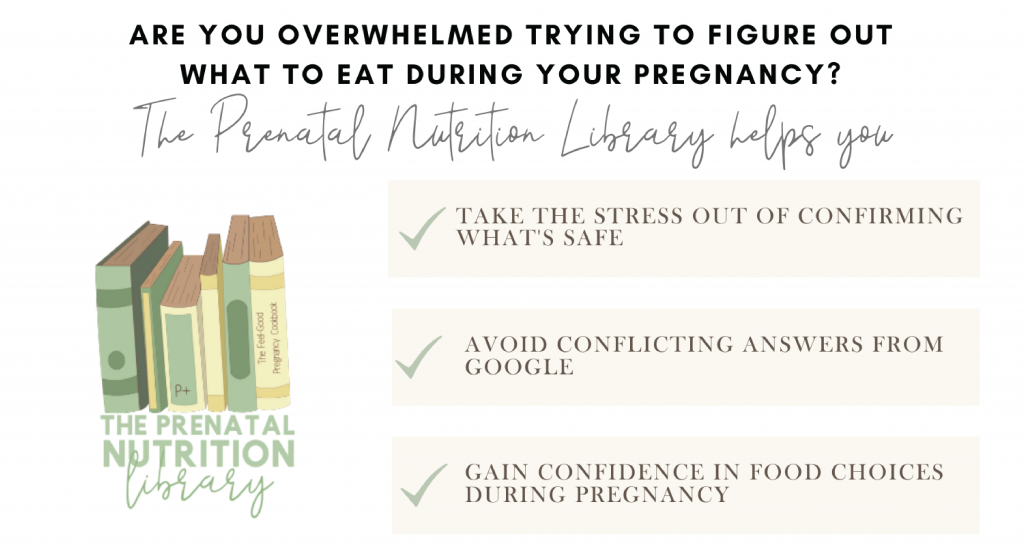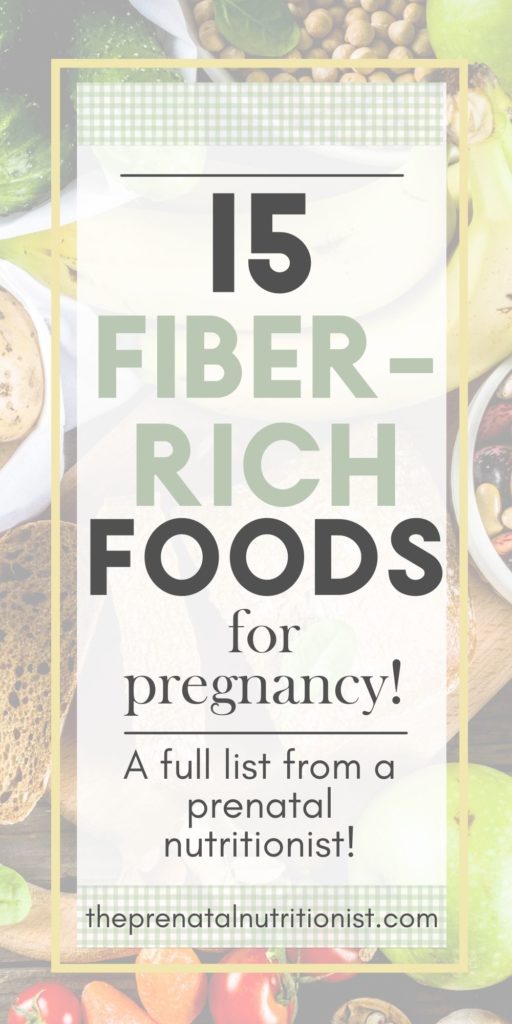
There are a lot of health benefits to consuming enough fiber during pregnancy. Dietary fiber can help keep you full and satisfied, prevent or combat constipation, support good blood sugar control, blood pressure, and more. With that in mind, pregnant women should try consuming at least 25 to 30 grams of dietary fiber daily.
Many people, including expectant mothers, struggle to get enough fiber in their diet. Morning sickness and food aversions can also make it difficult to maintain a balanced diet. That’s why it’s important to consciously drink plenty of water and focus on eating as many fiber-rich foods as possible.
I’ve compiled a list of 15 fiber-rich foods that are great options for pregnant women. If you want to add more fiber to your pregnancy diet, consider including at least one in your next meal.
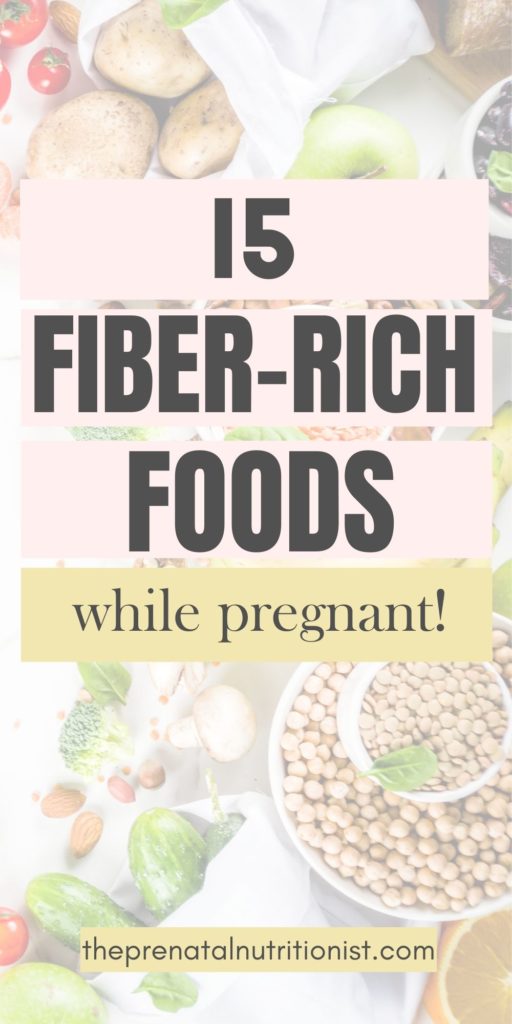
15 Fiber-Rich Foods For Pregnancy
Almonds
Almonds are a great high-fiber snack for pregnancy. They are delicious on their own or paired with other foods like fruit or cheese. Almonds and other nuts are often an ingredient in protein and snack bars. Some of these are pregnancy-safe protein bar options and a way to incorporate almonds.
Almonds are a great source of protein, magnesium, manganese, vitamin E, phosphorous, healthy fat, riboflavin, and omega-6 fatty acids.
They’re great as a snack and work well in a trail mix, sprinkled on top of yogurt or almond butter. If you don’t like almonds, feel free to try other nuts and seeds to help boost fiber intake.
Avocado
Avocado is a super nutrient-dense fiber-rich food for pregnancy. In fact, avocados have one of the highest fiber content of any food on this list. There are about 10 grams of fiber in one medium avocado. Avocados contain both soluble and insoluble fiber. Both types of fiber have separate benefits. Avocados are such to help you feel fuller for longer and also help with constipation.
Avocado also contains monounsaturated healthy fat, potassium, folate, and magnesium. Once you remove the peel and pit, add avocado to a salad, a slice of toast, a smoothie, or even eat it alone.
Chia Seeds
Chia seeds are one of the best high-fiber foods to fight pregnancy constipation. About 10 grams of fiber are in just two tablespoons of chia seeds. They contain the right fiber blend (soluble and insoluble fiber) to help absorb water and help you have a bowel movement.
These small but mighty seeds are true nutritional powerhouses. In addition to their impressive fiber content, chia seeds are a great source of healthy fat, non-dairy calcium, zinc, magnesium, and phosphorus. They’re also loaded with protein–considered a complete protein because they have all nine essential amino acids.
Chia seeds can be mixed into the batter of your favorite baked goods or sprinkled on top of oatmeal, yogurt, or smoothies. You can also turn them into a chia seed pudding.
Bran Cereal
Bran cereal is a fantastic high-fiber cereal for pregnancy. There are several good bran kinds of cereal to choose from, most of which offer about 5-8 grams of fiber per serving. It’s also a good source of potassium, protein, and iron.
Bran cereal may be tolerable when not much sounds good in the first trimester morning sickness phase. Just be sure to check the nutrition label and choose cereals that contain as little added sugar as possible.
Beans
Beans are among the less-surprising foods on this list–they’re well-known as a great source of fiber. Exactly how much fiber you’ll get depends on the bean you choose. In a ½ cup serving, navy beans have about 9.5 grams of fiber; lentils have about 8 grams; black beans have about 7.5 grams; and pinto, Lima, chickpeas, and black beans have 6 or 7 grams of fiber. Other types of beans are also high in fiber like kidney beans.
Both dried or bagged beans and canned can be options during pregnancy. Canned beans will be pre-cooked. If you’re using canned beans, be sure to rinse them before eating. Ideally, when selecting a canned option, choose a can that utilizes a BPA-free liner.
Beans make great additions to soups, salads, wraps, and dips. They can also be eaten as a side with rice or for breakfast with eggs and meat.
Baked Sweet Potato Or Yam
Sweet potatoes, with the skin, are a good source of fiber. About 4 to 5 grams of fiber are in one medium sweet potato. Sweet potatoes are also a good source of carbohydrates, potassium, manganese, and vitamins A, B6, and C.
Sweet potatoes are also a great source of antioxidants. Try eating a baked sweet potato with a little cinnamon and brown sugar sprinkled on top. Or make a delectable dish with oven-roasted sweet potatoes, chicken, brussels sprouts, and walnuts.
Spinach
Spinach is a super nutritious food that continues to be beneficial during pregnancy. It contains about 4 grams of fiber per 1 cup of cooked spinach.
Spinach is also a good source of vitamin A, manganese, magnesium, folate, and vitamin K. When expectant mothers enjoy raw spinach, it should be washed thoroughly first. Spinach leaves can also be blended in a smoothie or mixed into a savory dish.
Quinoa
For a good reason, Quinoa has gotten much more attention in recent years. It’s a naturally gluten-free whole grain loaded with fiber, some plant-based protein, vitamin E, magnesium, manganese, phosphorus, and folate. There are about 5 grams of fiber in ½ cup of quinoa.
It’s incredibly delicious when mixed with greens, meat, and a little seasoning. Quinoa mixed with spinach, chicken, or steak makes for a super tasty, well-balanced, blood sugar-friendly, and nutrient-packed meal. Next time you have a dish that calls for brown rice, try swapping with quinoa instead.
Steel Cut Oatmeal
I love oatmeal, especially steel-cut oatmeal! There are so many ways to customize oatmeal to your likely, and it’s a great source of fiber. About 4 or 5 grams of fiber are in ½ cup of cooked steel-cut oatmeal.
Oatmeal is a great breakfast food. You can eat it hot or cold with various toppings, including fruit, nuts, and seeds, to further boost the fiber count. You can also incorporate oatmeal into homemade granola or snack bars.
Because of its high fiber content, oatmeal is a great food to help you feel fuller for longer. It’s also often a well-tolerated food choice to help keep nausea at bay.
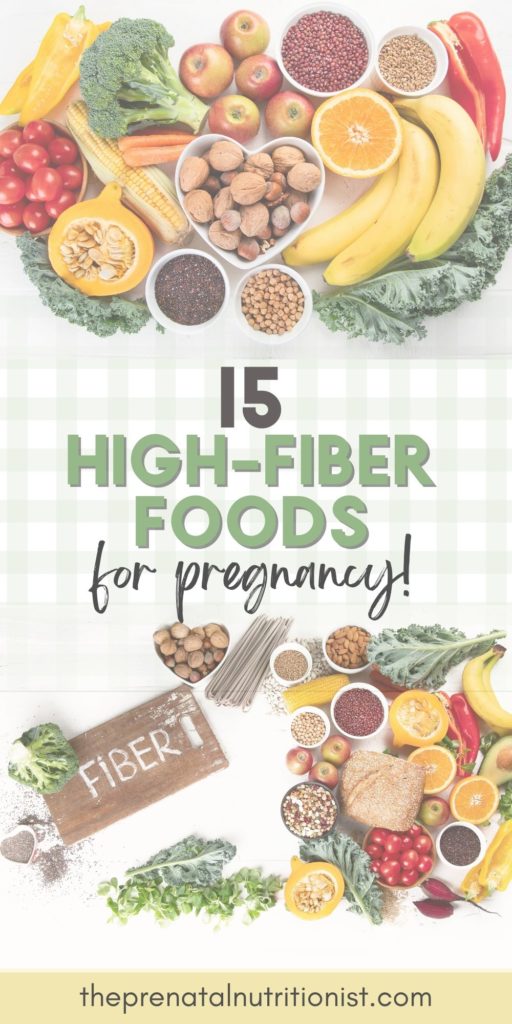
Ground Flax Seed
Flax seed packs in a nutritionally impressive punch. About 6 grams of fiber are in just two tablespoons of ground flax seeds.
Ground flax seeds, often called flax meal, contain soluble and insoluble fiber. They’re wonderful for supporting healthy cholesterol levels and heart health. Flax seeds also contain plant-based protein, healthy fats, copper, B vitamins, antioxidants, and manganese.
They’re very effective in relieving constipation. I recommend using ground flax seeds in moderation in combination with a wide variety of other food choices. My favorite way to incorporate ground flax seeds into a pregnancy diet is to blend 1 to 2 tablespoons into a delicious smoothie. You can add them to a serving of yogurt or use them in your favorite baked goods.
Prunes
Prunes are probably best known for their ability to relieve constipation and get things moving. There is about 1 gram of fiber per single bite-sized prune.
Dried prunes are great mixed into homemade trail mix. Or, if you have difficulty stomaching these little fruits, you can try drinking prune juice. Just be sure to keep juice in moderation, choosing whole fruits most of the time, and aim to choose unsweetened options free from added sugar.
Green Peas
Green peas are powerful little vegetables with impressive nutritional value. There are about 3.5 grams of fiber in ½ cup of peas. Peas also supply plant-based protein, thiamine, folate, and vitamins A, C, and K.
Green peas are a great addition to any meal. They are considered starchy vegetables because they supply more carbohydrates than other types of leafy greens and lower carbohydrate vegetable choices. Eat them as a side dish, in soups, or on a salad.
Pears
Pears are one of my favorite fruits, high in fiber for pregnancy. For optimal nutritional value, choose fresh pears whenever possible. A medium pear contains about 5 or 6 grams of fiber, as well as potassium, vitamin C, and antioxidants.
Pears contain insoluble fiber. While soluble fiber dissolves in water, insoluble fiber stays intact as it moves through your digestive system. Insoluble fiber helps to speed up and move things through the digestive tract, helping to prevent constipation.
Pears can be eaten just about any way you want. You can eat them raw after thoroughly washing them, or you can cook them and add them to sweet or savory dishes.
Blackberries
Blackberries are another delicious and nutritious fiber-rich food. There are 8 grams of fiber in 1 cup of blackberries. They are also a great source of antioxidants, vitamin C, magnesium, vitamin K, and manganese. Berries, in general, are a great way to get more fiber in your diet!
Before you eat blackberries, be sure to wash them thoroughly. Then you can enjoy them raw on their own, cooked into a jam, or blended into a smoothie.
Bananas
Finally, bananas are another option that boosts fiber and are great for pregnant women struggling with morning sickness. These easily-digestible fruits contain about 3-4 grams of fiber per medium banana. They are also a great source of potassium, which is a nutrient that can help prevent the leg cramps that some women experience during pregnancy.
Are Fiber Gummies Safe During Pregnancy?
Although “gummies” may sound similar, fiber gummies are not the same as fruit gummies or fruit snacks. Getting your fiber from whole foods is ideal. The first line of defense should be to incorporate more fruits, vegetables, water, and physical to combat constipation.
Some fiber gummies and supplements might have ingredients unsuitable for expectant mothers or lack safety data.
I highly recommend talking to your doctor, midwife, or dietitian before you take any supplements for constipation during pregnancy. They will help you determine whether fiber gummies, supplements, or a different option are right for you.
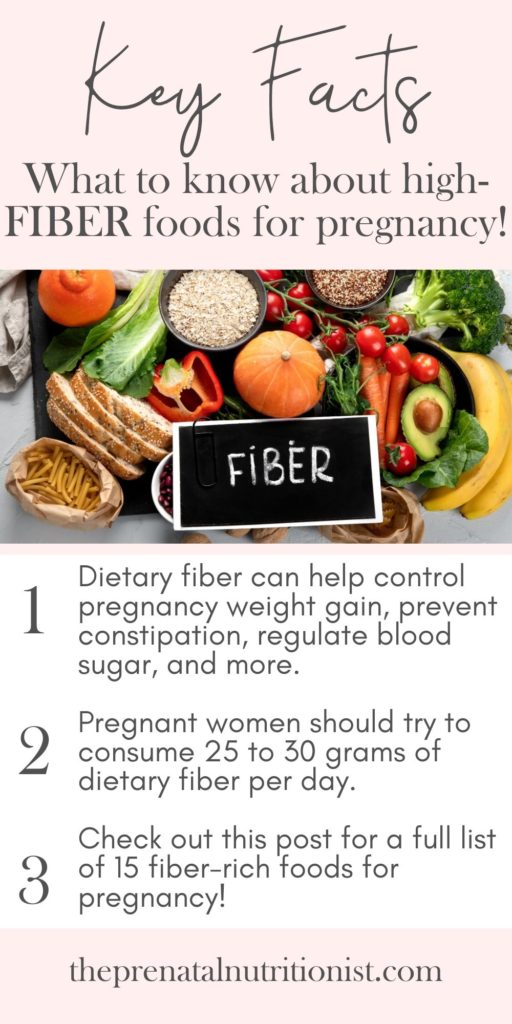
High-Fiber Meal Plan for Pregnancy
Meet your fiber needs easily when you follow our expert-crafted meal plans for preconception and pregnancy. Click here to unlock a FREE 7-day high-fiber meal plan for pregnancy!
What are some of your favorite fiber-rich foods?
I’d love to know which fiber-rich foods you enjoy the most. Share in the comments below. I enjoy hearing from my readers!
You can also find answers to more of your pressing questions, like “Are green beans a good source of fiber?”, “Is deli meat safe?” and “What about soft cheese during pregnancy?” inside the Prenatal Nutrition Library. Inside the library, you’ll find all the evidence-based information you need on providing nourishment for two before and during pregnancy. It’s the Google replacement for pregnancy nutrition!
TPNL also offers expertly crafted 60-day trimester-specific meal plans for preconception and pregnancy. Click here to join!
